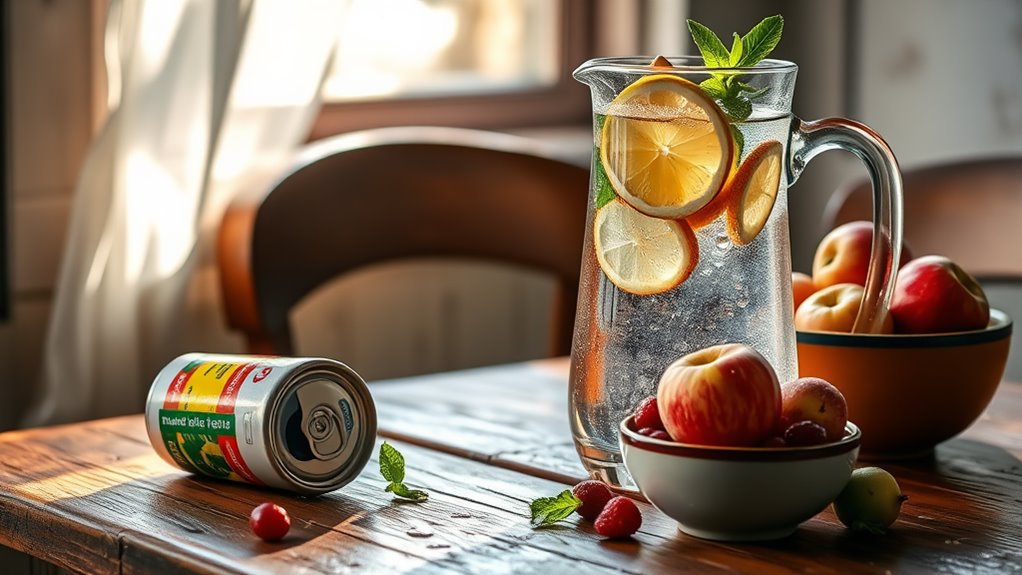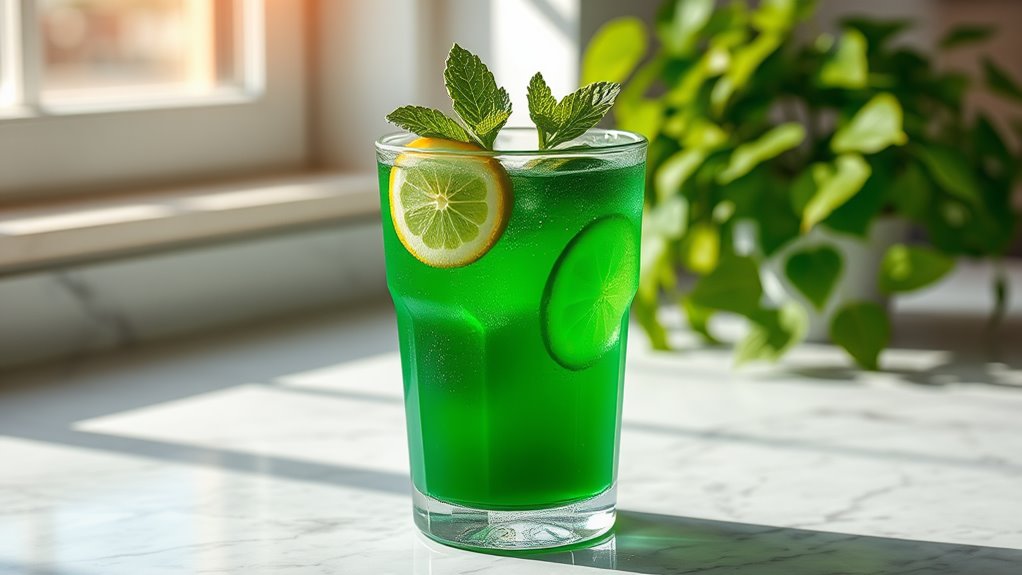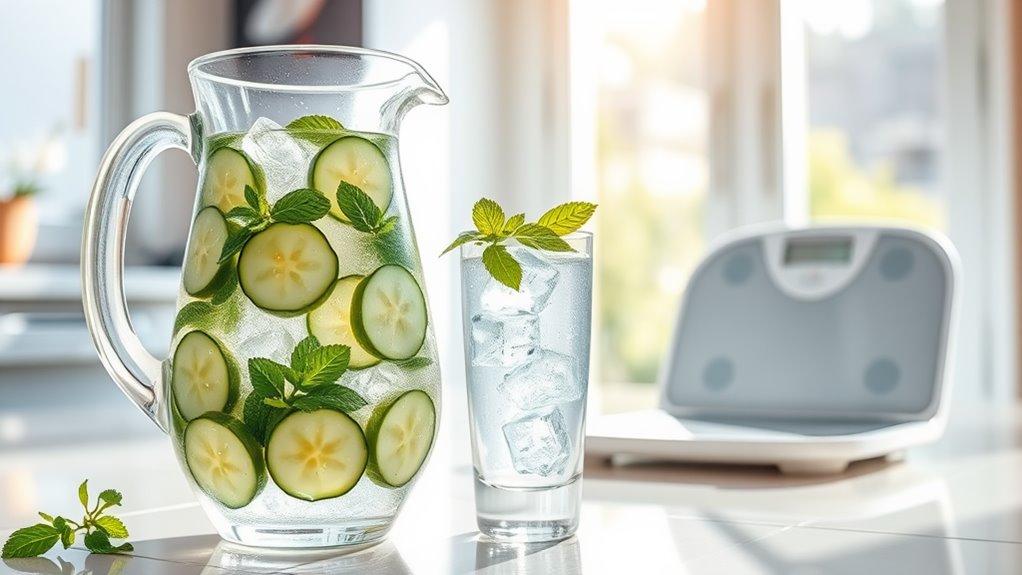You’re Drinking Water WRONG! The Right Way to Boost Fat Loss
You’re probably drinking water wrong if you want to boost fat loss! Start your day with water to kickstart your metabolism. Drink before meals to feel fuller, and stay hydrated during workouts for optimal performance. Don’t overlook temperature—cold water can burn a few extra calories, while warm water aids digestion. Aim for about half your body weight in ounces daily, but listen to your body’s thirst signals. Discover more hydration strategies that can enhance your fat loss journey.
The Science of Hydration and Fat Loss
When you stay properly hydrated, your body becomes more efficient at burning fat. It’s not just about quenching your thirst; there’s a correct way to drink water for weight loss that can make a real difference.
By sipping water throughout the day instead of gulping it all at once, you help your body absorb it better. This steady intake keeps your metabolism revved up, making it easier for you to shed those extra pounds.
Additionally, drinking a glass of water before meals can help you feel fuller, reducing the temptation to overeat. Proper hydration plays a crucial role in distinguishing between thirst and hunger, which can ultimately curb unnecessary snacking.
You’re not alone in this journey; staying hydrated can become a part of your daily routine, connecting you with others who are also striving for a healthier lifestyle.
Optimal Timing: When to Drink Water for Maximum Benefits
To reap the maximum benefits from drinking water, timing can play a crucial role in your fat loss journey. Knowing when to hydrate can enhance your metabolism and curb cravings effectively.
Here’s a quick guide on optimal water intake timing:
| Time to Drink Water | Benefits |
|---|---|
| Upon Waking | Kickstarts metabolism |
| 30 Minutes Before Meals | Reduces appetite, aids digestion |
| During Workouts | Maintains energy and performance |
| Before Bed | Supports overnight hydration |
Drinking water before meals can reduce calorie intake, making it an essential practice for effective weight management.
Temperature Matters: Cold vs. Warm Water for Weight Loss
Hydration isn’t just about how much water you drink; the temperature of the water can also influence your weight loss efforts. When you sip on cold water, your body burns extra calories to warm it up to your core temperature. This slight boost can support your weight loss journey, especially when incorporated into a routine.
On the other hand, warm water can aid digestion and help you feel fuller, reducing the urge to snack. This can be especially beneficial if you’re trying to manage cravings. Additionally, proper hydration can curb hunger and reduce unnecessary snacking, enhancing your overall weight loss strategy.
Ultimately, it’s about finding what works for you. Some people prefer the refreshing zing of cold water, while others enjoy the soothing warmth of a cup.
Both have their benefits, so why not try alternating between the two? You can create a hydration habit that not only supports your weight loss goals but also feels good and keeps you connected to your body’s needs.
How Much Water Do You Really Need?
How much water do you really need to fuel your weight loss journey? The answer varies, but a common guideline suggests drinking half your body weight in ounces daily.
So, if you weigh 160 pounds, aim for about 80 ounces. But remember, your needs can change based on activity level, climate, and personal health.
Listen to your body—it knows best! If you’re feeling thirsty, that’s your cue to hydrate.
And don’t forget to incorporate water-rich foods like fruits and veggies into your meals. Drinking water before meals can curb appetite and lead to better portion control.
Joining a community that shares your goals can also help. Share tips, support each other, and celebrate your progress.
When you stay committed to drinking enough water, you’re not just quenching your thirst; you’re also supporting your body’s natural processes.
Together, let’s make hydration a key part of your weight loss journey!
Common Myths About Water and Weight Loss Debunked
Many people believe that drinking water alone can lead to significant weight loss, but that’s just one of the myths surrounding hydration. Let’s debunk some common misconceptions about water and weight loss.
| Myth | Truth |
|---|---|
| Drinking water burns calories | Water itself doesn’t burn calories, but it can help control appetite. |
| Water eliminates toxins | Your body naturally detoxifies; water supports this but isn’t a magic solution. |
| More water equals more weight loss | Overhydration can lead to water retention, not weight loss. |
| Cold water burns more calories | The effect is minimal; your body’s temperature regulation is efficient. |
Understanding these myths can help you approach your hydration habits more effectively. Remember, community matters! Share your hydration journey with friends, and you’ll feel more motivated to stay on track together. Additionally, staying adequately hydrated can support hormonal balance that regulates hunger, aiding in effective weight management.
Actionable Hydration Strategies for Effective Fat Loss
While you might think that simply drinking more water will lead to fat loss, implementing specific hydration strategies can make a significant difference in your weight loss journey.
Start by drinking a glass of water before each meal. This simple act can help you feel fuller and reduce your overall calorie intake.
Next, opt for water-rich foods like fruits and veggies. They not only hydrate you but also provide essential nutrients that support fat loss.
Aim to carry a reusable water bottle with you throughout the day, making it easier to sip regularly. Set reminders on your phone to stay on track.
Also, consider drinking cold water; your body burns calories warming it up!
Lastly, listen to your body—drink when you’re thirsty and don’t wait until you’re parched.



 Scroll to the bottom and click on the next page number
Scroll to the bottom and click on the next page number  to continue reading!
to continue reading!





